Tech
The Latest Tech News in Crypto and Blockchain

Feb. 7: Layer-2 network Metis launched the “Metis Liquid Staking Blitz (LSB), an initiative to bolster their LSD ecosystem and accelerate the growth of LSDs and LSD-focused products on their Layer 2 network and leveraging the 4.6M METIS Ecosystem Development Fund,” according to the team: “Metis’ LSB will create the first LSD for a layer-2 network’s native token, unlocking LSDs’ versatility and blending it with the Layer 2 network’s profit and growth potential. For the first 12 months, a 20% Mining Rewards Rate (the rate at which smart contracts reward lockers for block production) will apply to all sequencer nodes.”
Zengo Wallet Now Supports Layer-2 Network Arbitrum One
Feb. 7: Zengo’s support for Arbitrum One “is a big moment for the community, as it offers a seamless gateway to Zengo’s renowned security and user-friendly experience,” according to the team: “Zengo’s impeccable record of zero hacks or thefts since launch in 2018 (with over 1 million customers) is especially exciting for the Arbitrum One community, as they can now manage their assets with unparalleled security and engage in the ecosystem without the traditional complexities associated with seed phrases.”
Paxos Adopts Chainlink’s PayPal USD Price Feed to Accelerate RWAs
Feb. 7: To accelerate the adoption of PayPal USD (PYUSD), PayPal’s USD-backed stablecoin issued by Paxos, Chainlink now supports a PYUSD Chainlink Price Feed on Ethereum mainnet, according to the team: “This new PYUSD Price Feed allows users to view highly accurate, reliable and decentralized market data for PYUSD on the blockchain. This provides users the information needed to help create secure markets around PYUSD and adopt it as their preferred stablecoin to facilitate on-chain payments.” CoinDesk 20 asset: {LINK}
Solana-Based Neon EVM Integrates With deBridge for Cross-Chain
Feb. 7: Neon EVM, a parallelized Ethereum Virtual Machine on Solana, and deBridge are officially integrating for cross-chain interoperability, according to the team: “The blockchain interoperability market, expected to reach $2.8 billion by 2032, has adoption barriers due to user experience complexities. This integration is a streamlined solution. Users can bridge tokens directly to enhance the overall user experience by eliminating unnecessary intermediary steps and constraints. This has the potential to provide access to Ethereum’s $32.5 billion Total Value Locked (TVL) as of 1/30/2024. For Neon EVM’s devs, it gives a direct gateway for interoperability with EVM-native chains.” CoinDesk 20 asset: {SOL}
OP Labs Hires Former Consensys Developer Ben Edgington as Lead Technical Program Manager
Feb. 7: OP Labs, the primary developer firm behind the Optimism blockchain, has brought on Ben Edgington as lead technical program manager. Edgington was previously at Consensys for over six years, where he founded their Protocols R&D team, and was part of the core group in charge of developing Teku, an Ethereum software client.
Solana-Based Digital Art Marketplace Exchange.art Appoints Laris Barbu as CEO
Feb. 7: Exchange.art, a digital art marketplace on Solana, has appointed Larisa Barbu as CEO, “marking the first female to lead an on-chain marketplace,” according to the team: “Focused on broader digital art adoption, Larisa plans to forge strategic partnerships and drive Exchange.art to be the premier digital hub for fine art. Larisa’s interim leadership showcased adaptability and resilience throughout the bear market. In Q4 the platform had a 1,000% sales increase, outperforming competitors. This success positions Larisa to confidently lead through future industry volatility, entering her role during a promising market rebound.”
Voi Network Launches as ‘Iteration’ of Algorand’s Open-Source Code
Feb. 7: Voi Network has been launched by veteran members of the Algorand proof-of-stake blockchain ecosystem, as a new iteration of the open-source code, according to the team: “The development of Voi, a layer-1 blockchain that will be launching in Q2, was fueled by the team’s frustration with the current shortcomings of the crypto industry. In response, Voi will allocate a significant 75% of its market cap to provide economic incentives for its network contributors and almost 800 participation nodes.” The project disclosed in December that it was backed by Arrington Capital, an original investor in Algorand, as well as Sonic Boom Ventures, founded by former Algorand Inc. CEO Steve Kokinos.
Protocol Village is a regular feature of The Protocol, our weekly newsletter exploring the tech behind crypto, one block at a time. Sign up here to get it in your inbox every Wednesday. Project teams can submit updates here. For previous versions of Protocol Village, please go here. Also please check out our weekly The Protocol podcast.
DeFi Credit Marketplace Clearpool Launches on Mantle Network
Feb. 6: Clearpool, the leading DeFi credit marketplace powered by its native token, $CPOOL, has “announced its successful launch on Mantle Network, a layer 2 rollup that combines Ethereum’s security with cheaper gas fees and higher throughput,” according to the team. “Clearpool has received a significant grant of 250K MNT tokens – dedicated to promoting Clearpool’s growth on Mantle. Continuing with the impressive expansion of its borrower ecosystem, Clearpool also announces two new borrowers, Arbelos Markets and Adaptive Frontier, who are launching permissionless pools on the Clearpool Mantle Market.”
Omega Announces $6M in Funding to Launch Bitcoin Web3 Infrastructure
Feb. 6: Omega announces $6M in funding from investors including Lightspeed Faction, Bankless Ventures, Wave Digital and more. According to the team: “The funding will be used to help launch Omega’s Bitcoin Web3 infrastructure – the first decentralized solution that enables bitcoin holders to utilize the value of their Layer 1 BTC for yield generation without having to bridge, wrap or synthesize it, allowing native Bitcoin to be used for DeFi.” CoinDesk 20 asset: {BTC}
Citrea, by Chainway Labs, Emerges From Stealth as ‘Bitcoin’s First ZK Rollup’
Feb. 6: Citrea, incubated by Chainway Labs and billed as “Bitcoin’s first ZK rollup,” emerged from stealth. As reported by CoinDesk Turkiye: “Ekrem Bal, co-founder of Chainway Labs, stated that they have made important progress with the verification of the groth16 proof of this technology on BitVM in 20B cycles, and emphasized that this progress represents an ‘amazing milestone’ for the Bitcoin ecosystem. By strengthening the Bitcoin blockchain space with zero-knowledge technology, Citrea aims to enable more complex applications while maintaining the security of the Bitcoin network. This technology offers a way to scale Bitcoin without changing its fundamental principles.”
Radix Releases Wallet Update, Triggers ‘Anemone’ Upgrade on Mainnet
Feb. 6: Radix, a platform for DeFi and Web3, released two updates this week. According to the team, Radix “has launched its v1.4.0 version of the Radix Wallet, which aims to improve the network staking experience. The update introduces an at-a-glance summary of a user’s total stakes, un-stakes and claims, rather than showing these as raw transaction manifests as it did previously. Additionally, Radix also launched its Anemone upgrade on mainnet. The upgrade includes support for new protocol update features such as the flash transaction type, system API extensions, protocol update thresholds, and node monitoring enhancements.”
Oasys to Integrate With NFT Marketplace X2Y2
Feb. 6: Oasys, a blockchain gaming ecosystem, “is joining forces with X2Y2, an NFT marketplace platform, to integrate their X2Y2 Pro NFT aggregator,” according to the team: “The integration brings numerous advantages to both gamers and developers. Players will gain enhanced capabilities to trade and lend their in-game NFTs, while developers will have the ability to leverage X2Y2 Pro to create more engaging and dynamic economies. Gaming platforms already involved are Gesoten by GMO, DM2 Verse (user base of 41 million members and part of DMM Group), HOME Verse (operated by publicly traded company double jump.tokyo Inc.).”
Railway Wallet Open-Sources Code Under GPL v2 License
Feb. 6: Railway Wallet has made its code fully open-source under a GPL v2 License, clearing the way for Ethereum developers to build their own robust privacy wallets and apps, according to the team: “Named by Ethereum co-founder Vitalik Buterin as a promising ‘second-generation’ privacy product, the Railway privacy wallet is the most popular frontend for the RAILGUN privacy system for Ethereum and EVM chains. Railway’s move comes in response to Buterin’s call to ‘make Ethereum cypherpunk again.’ View and download the code at: https://github.com/Railway-Wallet.“
Truflation, Provider of Economic Data Via Chainlink, Raises $6M
Feb. 6: Truflation, a provider of verifiable economic data that makes data available on-chain via Chainlink, has closed a funding round, raising $6 million from leading crypto investors, according to the team: “The list of VCs includes Laser Digital, Red Beard Ventures, Modular Capital, Abra, G20 and Four Seasons Ventures (4SV), alongside existing investors Chainlink, Fundamental Labs, C2squared, Cogitent Ventures, and the Israeli Blockchain Association. The investment round also saw the Base Ecosystem Fund, managed by Coinbase Ventures, select Truflation among its first cohort of investments from a shortlist of more than 800 applications.” CoinDesk 20 asset: {LINK}
Reflexer Team Says HAI Stablecoin Set for Optimism Mainnet, Airdrop
Feb. 6: The team behind Reflexer Finance, a platform for minting stablecoins backed by crypto collateral, says “HAI, a decentralized, community-governed, controlled-peg stablecoin and lending protocol built on Optimism,” will go live on Optimism Mainnet on Feb. 20. According to the team: “The project will airdrop tokens to qualifying wallets on Feb. 12.”
Nibiru Chain Raises $12M From Kraken Ventures, ArkStream, NGC, Master, Tribe, Ban
Feb. 5: Nibiru Chain, a developer-focused Layer-1 chain, has raised $12 million funding from Kraken Ventures, ArkStream, NGC, Master Ventures, Tribe Capital and Banter Capital to accelerate its ecosystem growth, according to the team: “Nibiru optimizes for developers with a built-in dev toolkit, easy-to-use APIs, language SDKs, and a native oracle. It offers 40,000 TPS, 1.4s block times, and robust security, thanks in part to the CosmWasm smart contracts. Its built-in DeFi super applications, along with native oracle and data-indexing functionalities, significantly reduce the technical selection difficulties for DeFi projects.”
Filecoin’s Liquid Staker Glif Raises $4.5M, Hints at Token Airdrop
Feb. 5: Data storage-centric blockchain Filecoin isn’t exactly known for its decentralized finance (DeFi) landscape. Glif, one of its longtime ecosystem contributors, is trying to change that. The startup has raised $4.5 million in seed funding from Multicoin Capital and other VCs to build out its tools for earning yield on FIL, Filecoin’s “gas” token that pays for data storage and retrieval on the network. CoinDesk 20 asset: {FIL}
Radix Launches Ecosystem Fund for Developers Worth More Than $1M
Feb. 5: Radix has launched a 25 million XRD Ecosystem Fund to accelerate the growth of its builders’ community, according to the team: “Currently worth over US$1 million, the fund will support new activities, rewards and grants to developers and entrepreneurs in the ecosystem. These include developer incentives of up to $1,500 in XRD, milestone rewards as well as Booster grants for co-marketing and partnership opportunities. The fund will also be funneled towards Radix’s upcoming Scrypto challenges and the second cohort of the Radix Grants Program.”
Web Registry GoDaddy, Ethereum Name Service Connect Domain Names With Crypto Wallets
Feb. 5: Ethereum Name Service (ENS), a domain name protocol that runs atop of Ethereum, reached an agreement with GoDaddy to allow users to link internet domains to their ENS addresses for free. “Beyonce owns Beyonce.xyz, and now she can set up a wallet just by going into the GoDaddy page and entering your address,” Nick Johnson, the founder of ENS, told CoinDesk as an example. “Now Beyonce.xyz is her wallet identifier for all intents and purposes.”
Crypto Payments App Oobit Raises $25M in Series A Funding Round Led by Tether
Feb. 5: Mobile payments app Oobit raised $25 million in a Series A funding round, the company said Monday. The round was led by the investment arm of Tether, CMCC Global’s Titan Fund, 468 Capital and Solana co-founder Anatoly Yakovenko. Consumers can use the Oobit app to pay for purchases using crypto, while merchants receive fiat currency. The tap-and-pay feature helps make crypto payments more accessible, as users can pay at any point of sale that accepts Visa (V) or MasterCard (MA) using funds from their Oobit wallet.
Kodiak Finance, Berachain-Based DEX Project, Raises $2M
Feb. 2: Kodiak Finance, aiming to becoming the “community-native DEX of Berachain,” announced the close of a $2 million seed financing round. According to the team: “The funding will further enable us to increase the pace at which we scale Kodiak and allow us to continue delivering amazing trading products native to Berachain.”
Staking Service Luganodes Adds Support for Bitcoin L2 Stacks
Feb. 1: Luganodes, provider of an institutional-grade staking service, is “bringing its muscle” to Stacks, a Bitcoin layer-2 network, according to the team: “This means institutions can now easily earn native BTC rewards while supporting the network and enjoying faster, cheaper transactions with complete Bitcoin security. Luganodes will also be a Signer on the upcoming Nakamoto upgrade, solidifying its commitment to the Stacks ecosystem.” According to a blog post, Luganodes “ranks among the top validators on Polygon, Polkadot, Sui and Tron.”
Pyth Deploys ‘Pyth Entropy,’ for On-Chain Random Number Generation
Feb. 1: Pyth, a blockchain oracle project, announced the future deployment of Pyth Entropy, “aimed at enhancing on-chain random number generation across various Web3 verticals such as prediction markets and GameFi,” according to the team: “The announcement marks a significant milestone as Pyth Entropy is primed to launch on a blockchain on mainnet for the first time, ushering in a new era for decentralized applications. Additionally, Pyth has unveiled the mainnet deployment of Pyth Price Feeds on LightLink, an Ethereum layer-2 blockchain. This now enables dApps and enterprises to offer users instant, gasless transactions. Starting today, smart contract developers in the LightLink ecosystem can permissionlessly access over 400 real-time price feeds across major asset classes to power their DeFi applications.”
Cube.Exchange Raises $12M From Investors Including 6th Man, Asymmetric
Feb. 1: Cube.Exchange, a soon-to-launch digital asset trading platform, has raised $12 million as part of a Series A fundraise, according to the team: “Investors in the round, led by 6th Man Ventures, include Asymmetric, ParaFi Digital, Foundation Capital, Susquehanna Private Equity Investments, LLLP, GSR Markets, Everstake Capital, Big Brain Holdings, Third Kind Venture Capital, Arche Fund, WW Ventures and prominent angels. Proceeds will be used to expand engineering, customer service, operations, legal and compliance, business development; and to obtain licenses.” This raise came as a result of inbound interest, according to the company, and comes on top of a $9 million seed round announced in October.
Sanctor Capital Raises $10M for Early Stage Web3 Fund
Feb. 1: Sanctor Capital raised $10 million for its early stage Web3 investment fund, according to the team: “It is also announcing a partnership with Press Start to launch a pre-accelerator program called The Multiplayer Fellowship. Together, Sanctor and Press Start aim to fund 100 teams over the next 18 months. Half of the graduates of Press Start’s previous fellowship programs have gone on to raise or join top accelerators such as Alliance DAO, a16z Crypto Startup School & SPEEDRUN, Binance Labs and Y Combinator.”
Upshot Unveils Allora, a Network for ‘Self-Improving Decentralized AI’
Feb. 1: Upshot unveiled Allora, a new “trustless, self-improving decentralized AI network,” according to the team. “Allora is designed to empower applications with smarter, more secure AI through a self-improving network of machine learning models. Upshot is backed by industry investors including Polychain, Framework, Blockchain Capital, and CoinFund.”
Prediction Market Zeitgeist Launches DLMSR-Based AMM
Feb. 1: Zeitgeist, a prediction market dApp, launched its DLMSR (Dynamic Logarithmic Market Scoring Rule) based automated market maker (AMM), according to the team, “marking a significant advancement in the blockchain prediction market with a dynamic liquidity model previously unseen in the industry. The DLMSR model represents a first-of-its-kind application in blockchain technology, enhancing the flexibility of market creation and liquidity provision while drastically improving operational dynamics by reducing slippage and thereby transforming trading efficiency and profitability, especially in larger trades.”
WOOFi, Cross-Chain DEX, Launches on Mantle Network
Feb. 1: WOOFi, a cross-chain DEX based in Saint Vincent and the Grenadines, has launched on Mantle Network, the Ethereum layer-2 scaling solution, according to the team: “This positions WOOFi as one of the first protocols to support LayerZero-powered cross-chain swaps into Mantle from eight top chains, including Arbitrum, Optimism, and Avalanche. Mantle’s MAU hit 370k in Jan 2024 post-LSP launch. VP of Ecosystem Ben Yorke notes the expected rise is fueled by easier mETH access, with WOOFi pivotal for its hyper-efficient cross-chain swaps, comprising 3.7% of LayerZero transactions.”
Tech
Harvard Alumni, Tech Moguls, and Best-Selling Authors Drive Nearly $600 Million in Pre-Order Sales
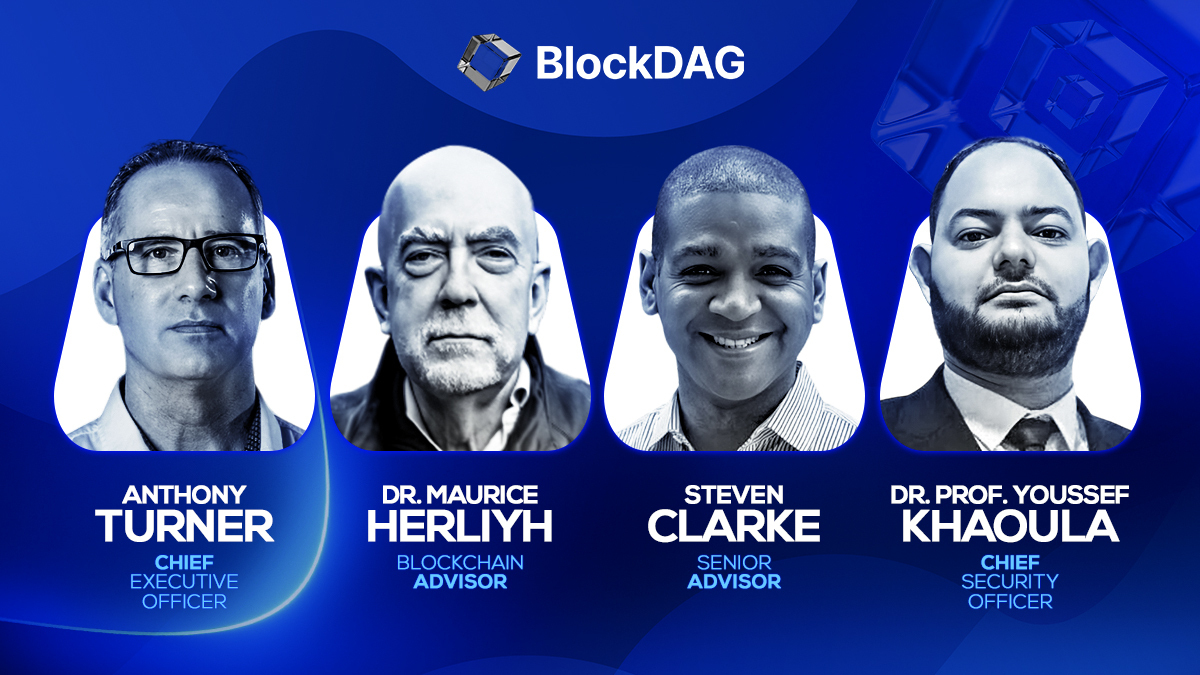
BlockDAG Network’s history is one of innovation, perseverance, and a vision to push the boundaries of blockchain technology. With Harvard alumni, tech moguls, and best-selling authors at the helm, BlockDAG is rewriting the rules of the cryptocurrency game.
CEO Antony Turner, inspired by the successes and shortcomings of Bitcoin and Ethereum, says, “BlockDAG leverages existing technology to push the boundaries of speed, security, and decentralization.” This powerhouse team has led a staggering 1,600% price increase in 20 pre-sale rounds, raising over $63.9 million. The secret? Unparalleled expertise and a bold vision for the future of blockchain.
Let’s dive into BlockDAG’s success story and find out what the future holds for this cryptocurrency.
The Origin: Why BlockDAG Was Created
In a recent interview, BlockDAG CEO Antony Turner perfectly summed up why the market needs BlockDAG’s ongoing revolution. He said:
“The creation of BlockDAG was inspired by Bitcoin and Ethereum, their successes and their shortcomings.
If you look at almost any new technology, it is very rare that the first movers remain at the forefront forever. Later incumbents have a huge advantage in entering a market where the need has been established and the technology is no longer cutting edge.
BlockDAG has done just that: our innovation is incorporating existing technology to provide a better solution, allowing us to push the boundaries of speed, security, and decentralization.”
The Present: How Far Has BlockDAG Come?
BlockDAG’s presale is setting new benchmarks in the cryptocurrency investment landscape. With a stunning 1600% price increase over 20 presale lots, it has already raised over $63.9 million in capital, having sold over 12.43 billion BDAG coins.
This impressive performance underscores the overwhelming confidence of investors in BlockDAG’s vision and leadership. The presale attracted over 20,000 individual investors, with the BlockDAG community growing exponentially by the hour.

These monumental milestones have been achieved thanks to the unparalleled skills, experience and expertise of BlockDAG’s management team:
Antony Turner – Chief Executive Officer
Antony Turner, CEO of BlockDAG, has over 20 years of experience in the Fintech, EdTech, Travel and Crypto industries. He has held senior roles at SPIRIT Blockchain Capital and co-founded Axona-Analytics and SwissOne. Antony excels in financial modeling, business management and scaling growth companies, with expertise in trading, software, IoT, blockchain and cryptocurrency.
Director of Communications
Youssef Khaoulaj, CSO of BlockDAG, is a Smart Contract Auditor, Metaverse Expert, and Red Team Hacker. He ensures system security and disaster preparedness, and advises senior management on security issues.
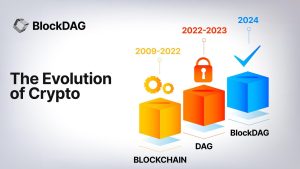
advisory Committee
Steven Clarke-Martin, a technologist and consultant, excels in enterprise technology, startups, and blockchain, with a focus on DAOs and smart contracts. Maurice Herlihy, a Harvard and MIT graduate, is an award-winning computer scientist at Brown University, with experience in distributed computing and consulting roles, most notably at Algorand.
The Future: Becoming the Cryptocurrency with the Highest Market Cap in the World
Given its impressive track record and a team of geniuses working tirelessly behind the scenes, BlockDAG is quickly approaching the $600 million pre-sale milestone. This crypto powerhouse will soon enter the top 30 cryptocurrencies by market cap.
Currently trading at $0.017 per coin, BlockDAG is expected to hit $1 million in the coming months, with the potential to hit $30 per coin by 2030. Early investors have already enjoyed a 1600% ROI by batch 21, fueling a huge amount of excitement around BlockDAG’s presale. The platform is seeing significant whale buying, and demand is so high that batch 21 is almost sold out. The upcoming batch is expected to drive prices even higher.

Invest in BlockDAG Pre-Sale Now:
Pre-sale: https://purchase.blockdag.network
Website: https://blockdag.network
Telegram: https://t.me/blockDAGnetwork
Discord: Italian: https://discord.gg/Q7BxghMVyu
No spam, no lies, just insights. You can unsubscribe at any time.
Tech
How Karak’s Latest Tech Integration Could Make Data Breaches Obsolete
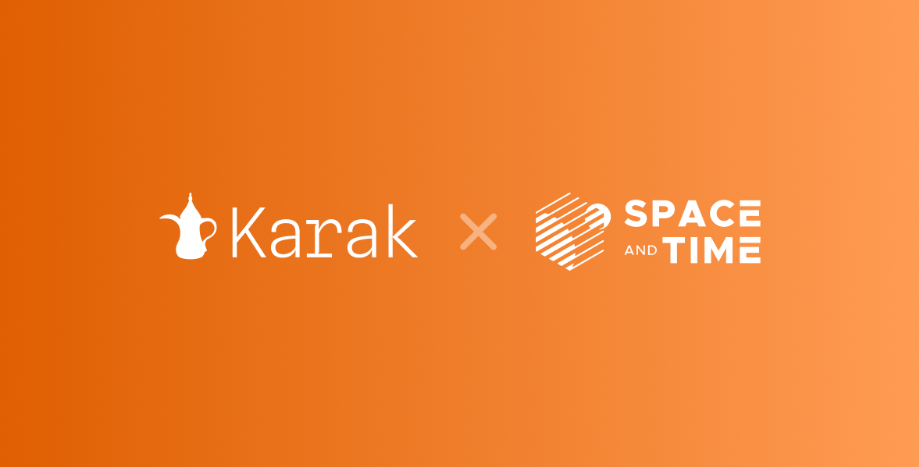
- Space and Time uses zero-knowledge proofs to ensure secure and tamper-proof data processing for smart contracts and enterprises.
- The integration facilitates faster development and deployment of Distributed Secure Services (DSS) on the Karak platform.
Karak, a platform known for its strong security capabilities, is enhancing its Distributed Secure Services (DSS) by integrating Space and Time as a zero-knowledge (ZK) coprocessor. This move is intended to strengthen trustless operations across its network, especially in slashing and rewards mechanisms.
Space and Time is a verifiable processing layer that uses zero-knowledge proofs to ensure that computations on decentralized data warehouses are secure and untampered with. This system enables smart contracts, large language models (LLMs), and enterprises to process data without integrity concerns.
The integration with Karak will enable the platform to use Proof of SQL, a new ZK-proof approach developed by Space and Time, to confirm that SQL query results are accurate and have not been tampered with.
One of the key features of this integration is the enhancement of DSS on Karak. DSS are decentralized services that use re-staked assets to secure the various operations they provide, from simple utilities to complex marketplaces. The addition of Space and Time technology enables faster development and deployment of these services, especially by simplifying slashing logic, which is critical to maintaining security and trust in decentralized networks.
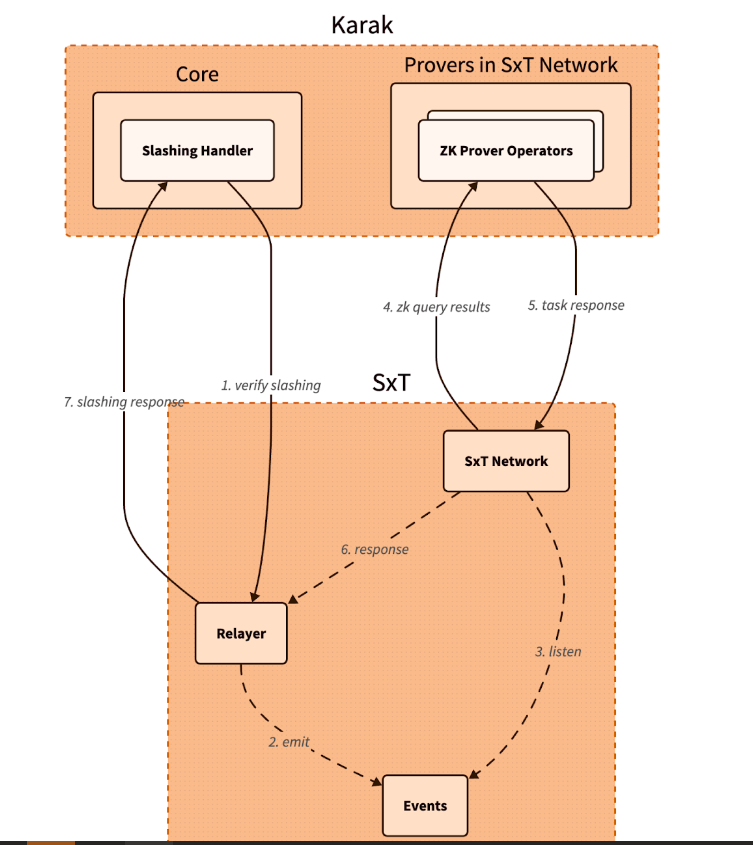
Additionally, Space and Time is developing its own DSS for blockchain data indexing. This service will allow community members to easily participate in the network by running indexing nodes. This is especially beneficial for applications that require high security and decentralization, such as decentralized data indexing.
The integration architecture follows a detailed and secure flow. When a Karak slashing contract needs to verify a SQL query, it calls the Space and Time relayer contract with the required SQL statement. This contract then emits an event with the query details, which is detected by operators in the Space and Time network.
These operators, responsible for indexing and monitoring DSS activities, validate the event and route the work to a verification operator who runs the query and generates the necessary ZK proof.
The result, along with a cryptographic commitment on the queried data, is sent to the relayer contract, which verifies and returns the data to the Karak cutter contract. This end-to-end process ensures that the data used in decision-making, such as determining penalties within the DSS, is accurate and reliable.
Karak’s mission is to provide universal security, but it also extends the capabilities of Space and Time to support multiple DSSs with their data indexing needs. As these technologies evolve, they are set to redefine the secure, decentralized computing landscape, making it more accessible and efficient for developers and enterprises alike. This integration represents a significant step towards a more secure and verifiable digital infrastructure in the blockchain space.
Website | X (Twitter) | Discord | Telegram
No spam, no lies, just insights. You can unsubscribe at any time.
Tech
Cryptocurrency Payments: Should CFOs Consider This Ferrari-Approved Trend?

Iconic Italian luxury carmaker Ferrari has announced the expansion of its cryptocurrency payment system to its European dealer network.
The move, which follows a successful launch in North America less than a year ago, raises a crucial question for CFOs across industries: Is it time to consider accepting cryptocurrency as a form of payment for your business?
Ferrari’s move isn’t an isolated one. It’s part of a broader trend of companies embracing digital assets. As of 2024, we’re seeing a growing number of companies, from tech giants to traditional retailers, accepting cryptocurrencies.
This change is determined by several factors:
- Growing mainstream adoption of cryptocurrencies
- Growing demand from tech-savvy and affluent consumers
- Potential for faster and cheaper international transactions
- Desire to project an innovative brand image
Ferrari’s approach is particularly noteworthy. They have partnered with BitPay, a leading cryptocurrency payment processor, to allow customers to purchase vehicles using Bitcoin, Ethereum, and USDC. This satisfies their tech-savvy and affluent customer base, many of whom have large digital asset holdings.
Navigating Opportunities and Challenges
Ferrari’s adoption of cryptocurrency payments illustrates several key opportunities for companies considering this move. First, it opens the door to new customer segments. By accepting cryptocurrency, Ferrari is targeting a younger, tech-savvy demographic—people who have embraced digital assets and see them as a legitimate form of value exchange. This strategy allows the company to connect with a new generation of affluent customers who may prefer to conduct high-value transactions in cryptocurrency.
Second, cryptocurrency adoption increases global reach. International payments, which can be complex and time-consuming with traditional methods, become significantly easier with cryptocurrency transactions. This can be especially beneficial for businesses that operate in multiple countries or deal with international customers, as it potentially reduces friction in cross-border transactions.
Third, accepting cryptocurrency positions a company as innovative and forward-thinking. In today’s fast-paced business environment, being seen as an early adopter of emerging technologies can significantly boost a brand’s image. Ferrari’s move sends a clear message that they are at the forefront of financial innovation, which can appeal to customers who value cutting-edge approaches.
Finally, there is the potential for cost savings. Traditional payment methods, especially for international transactions, often incur substantial fees. Cryptocurrency transactions, on the other hand, can offer lower transaction costs. For high-value purchases, such as luxury cars, these savings could be significant for both the business and the customer.
While the opportunities are enticing, accepting cryptocurrency payments also presents significant challenges that businesses must address. The most notable of these is volatility. Cryptocurrency values can fluctuate dramatically, sometimes within hours, posing potential risk to businesses that accept them as payment. Ferrari addressed this challenge by implementing a system that instantly converts cryptocurrency received into traditional fiat currencies, effectively mitigating the risk of value fluctuations.
Regulatory uncertainty is another major concern. The legal landscape surrounding cryptocurrencies is still evolving in many jurisdictions around the world. This lack of clear and consistent regulations can create compliance challenges for companies, especially those operating internationally. Companies must remain vigilant and adaptable as new laws and regulations emerge, which can be a resource-intensive process.
Implementation costs are also a significant obstacle. Integrating cryptocurrency payment systems often requires substantial investment in new technology infrastructure and extensive staff training. This can be especially challenging for small businesses or those with limited IT resources. The costs are not just financial; a significant investment of time is also required to ensure smooth implementation and operation.
Finally, security concerns loom large in the world of cryptocurrency transactions. While blockchain technology offers some security benefits, cryptocurrency transactions still require robust cybersecurity measures to protect against fraud, hacks, and other malicious activity. Businesses must invest in robust security protocols and stay up-to-date on the latest threats and protections, adding another layer of complexity and potential costs to accepting cryptocurrency payments.
Strategic Considerations for CFOs
If you’re thinking of following in Ferrari’s footsteps, here are the key factors to consider:
- Risk Assessment: Carefully evaluate potential risks to your business, including financial, regulatory, and reputational risks.
- Market Analysis: Evaluate whether your customer base is significantly interested in using cryptocurrencies for payments.
- Technology Infrastructure: Determine the costs and complexities of implementing a cryptographic payment system that integrates with existing financial processes.
- Regulatory Compliance: Ensure that cryptocurrency acceptance is in line with local regulations in all markets you operate in. Ferrari’s gradual rollout demonstrates the importance of this consideration.
- Financial Impact: Analyze how accepting cryptocurrency could impact your cash flow, accounting practices, and financial reporting.
- Partnership Evaluation: Consider partnering with established crypto payment processors to reduce risk and simplify implementation.
- Employee Training: Plan comprehensive training to ensure your team is equipped to handle cryptocurrency transactions and answer customer questions.
While Ferrari’s adoption of cryptocurrency payments is exciting, it’s important to consider this trend carefully.
A CFO’s decision to adopt cryptocurrency as a means of payment should be based on a thorough analysis of your company’s specific needs, risk tolerance, and strategic goals. Cryptocurrency payments may not be right for every business, but for some, they could provide a competitive advantage in an increasingly digital marketplace.
Remember that the landscape is rapidly evolving. Stay informed about regulatory changes, technological advancements, and changing consumer preferences. Whether you decide to accelerate your crypto engines now or wait in the pit, keeping this payment option on your radar is critical to navigating the future of business transactions.
Was this article helpful?
Yes No
Sign up to receive your daily business insights
Tech
Bitcoin Tumbles as Crypto Market Selloff Mirrors Tech Stocks’ Plunge
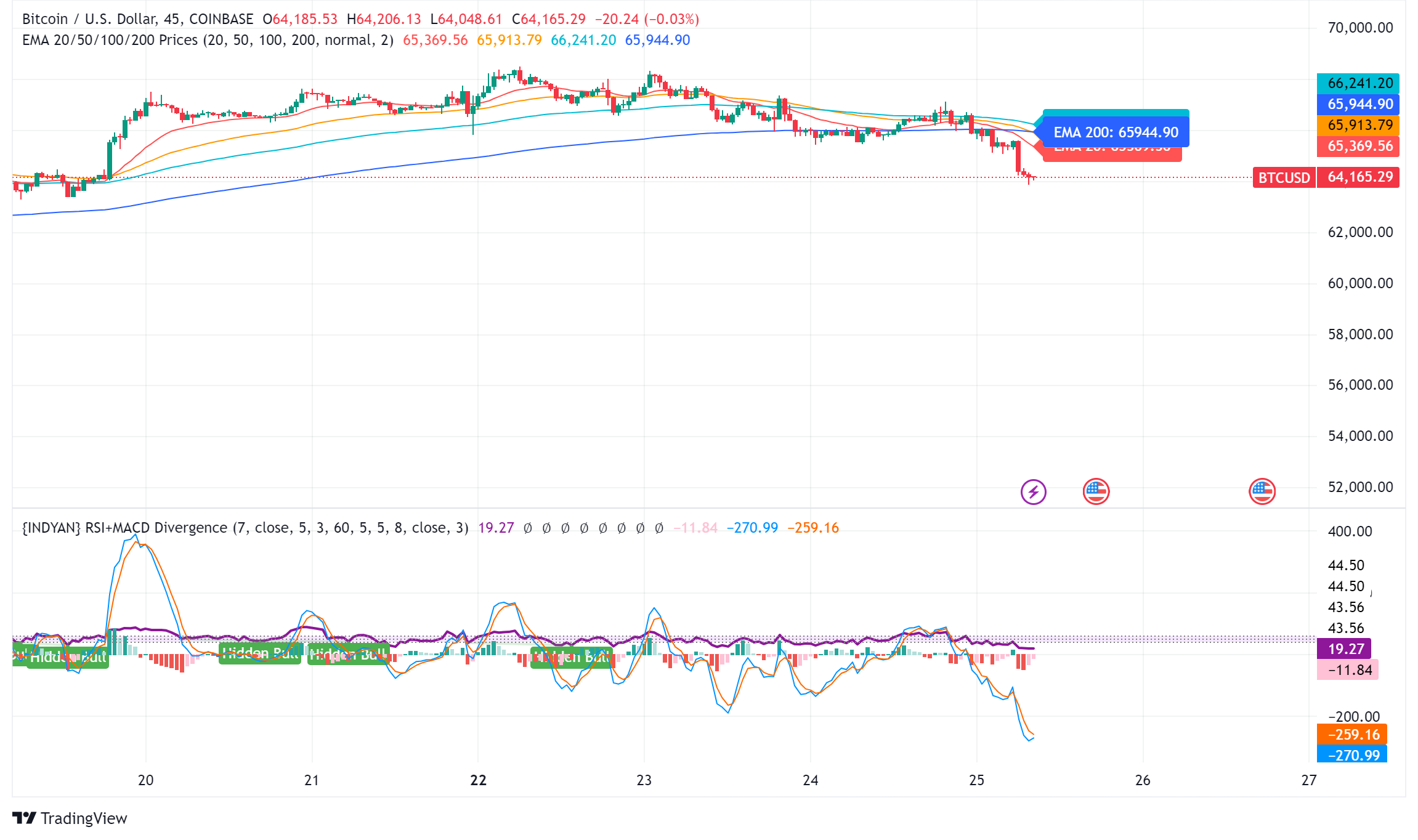
The world’s largest cryptocurrency, Bitcoin (BTC), suffered a significant price decline on Wednesday, falling below $65,000. The decline coincides with a broader market sell-off that has hit technology stocks hard.
Cryptocurrency Liquidations Hit Hard
CoinGlass data reveals a surge in long liquidations in the cryptocurrency market over the past 24 hours. These liquidations, totaling $220.7 million, represent forced selling of positions that had bet on price increases. Bitcoin itself accounted for $14.8 million in long liquidations.
Ethereum leads the decline
Ethereal (ETH), the second-largest cryptocurrency, has seen a steeper decline than Bitcoin, falling nearly 8% to trade around $3,177. This decline mirrors Bitcoin’s price action, suggesting a broader market correction.
Cryptocurrency market crash mirrors tech sector crash
The cryptocurrency market decline appears to be linked to the significant losses seen in the U.S. stock market on Wednesday. Stock market listing The index, heavily weighted toward technology stocks, posted its sharpest decline since October 2022, falling 3.65%.
Analysts cite multiple factors
Several factors may have contributed to the cryptocurrency market crash:
- Tech earnings are underwhelming: Earnings reports from tech giants like Alphabet are disappointing (Google(the parent company of), on Tuesday, triggered a sell-off in technology stocks with higher-than-expected capital expenditures that could have repercussions on the cryptocurrency market.
- Changing Political Landscape: The potential impact of the upcoming US elections and changes in Washington’s policy stance towards cryptocurrencies could influence investor sentiment.
- Ethereal ETF Hopes on the line: While bullish sentiment around a potential U.S. Ethereum ETF initially boosted the market, delays or rejections could dampen enthusiasm.
Analysts’ opinions differ
Despite the short-term losses, some analysts remain optimistic about Bitcoin’s long-term prospects. Singapore-based cryptocurrency trading firm QCP Capital believes Bitcoin could follow a similar trajectory to its post-ETF launch all-time high, with Ethereum potentially converging with its previous highs on sustained institutional interest.
Rich Dad Poor Dad Author’s Prediction
Robert Kiyosaki, author of the best-selling Rich Dad Poor Dad, predicts a potential surge in the price of Bitcoin if Donald Trump is re-elected as US president. He predicts a surge to $105,000 per coin by August 2025, fueled by a weaker dollar that is set to boost US exports.
BTC/USD Technical Outlook
Bitcoin price is currently trading below key support levels, including the $65,500 level and the 100 hourly moving average. A break below the $64,000 level could lead to further declines towards the $63,200 support zone. However, a recovery above the $65,500 level could trigger another increase in the coming sessions.
-

 News10 months ago
News10 months agoVolta Finance Limited – Director/PDMR Shareholding
-

 News10 months ago
News10 months agoModiv Industrial to release Q2 2024 financial results on August 6
-

 News10 months ago
News10 months agoApple to report third-quarter earnings as Wall Street eyes China sales
-

 News10 months ago
News10 months agoNumber of Americans filing for unemployment benefits hits highest level in a year
-

 News1 year ago
News1 year agoInventiva reports 2024 First Quarter Financial Information¹ and provides a corporate update
-

 News1 year ago
News1 year agoLeeds hospitals trust says finances are “critical” amid £110m deficit
-

 DeFi1 year ago
DeFi1 year ago🏴☠️ Pump.Fun operated by Insider Exploit
-

 Tech1 year ago
Tech1 year agoBitcoin’s Correlation With Tech Stocks Is At Its Highest Since August 2023: Bloomberg ⋆ ZyCrypto
-

 Tech1 year ago
Tech1 year agoEverything you need to know
-

 Markets12 months ago
Markets12 months ago20 Top Crypto Trading Platforms to Know
-

 News10 months ago
News10 months agoStocks wobble as Fed delivers and Meta bounces
-

 Markets1 year ago
Markets1 year agoWhale Investments in Bitcoin Hit $100 Billion in 2024, Fueling Insane Investor Optimism ⋆ ZyCrypto












